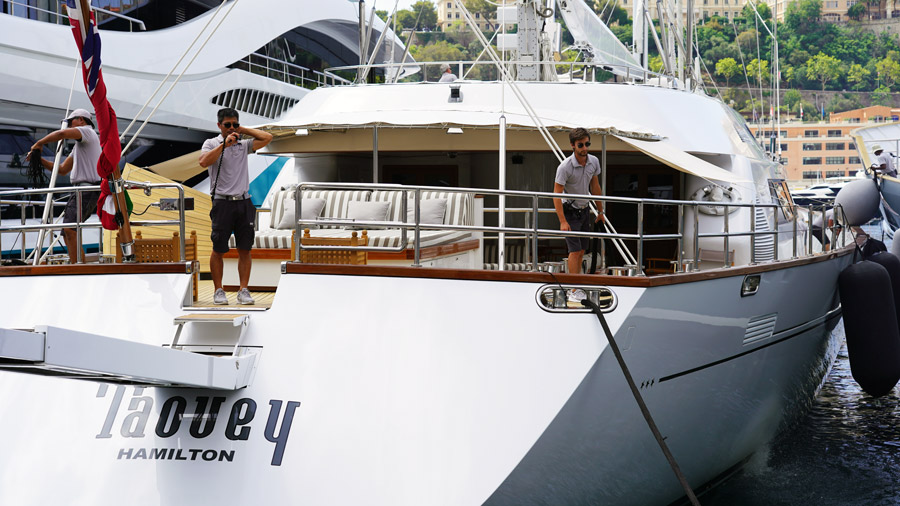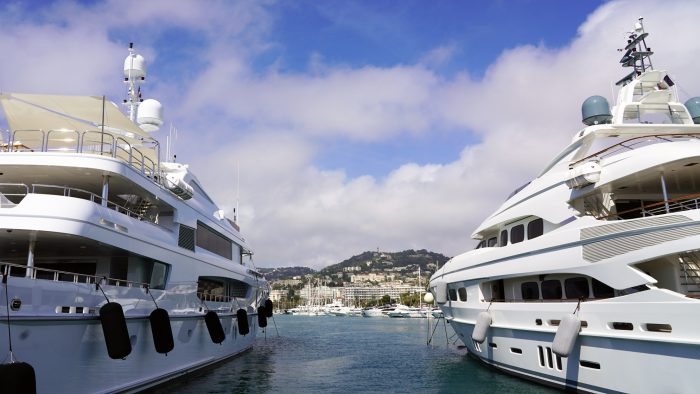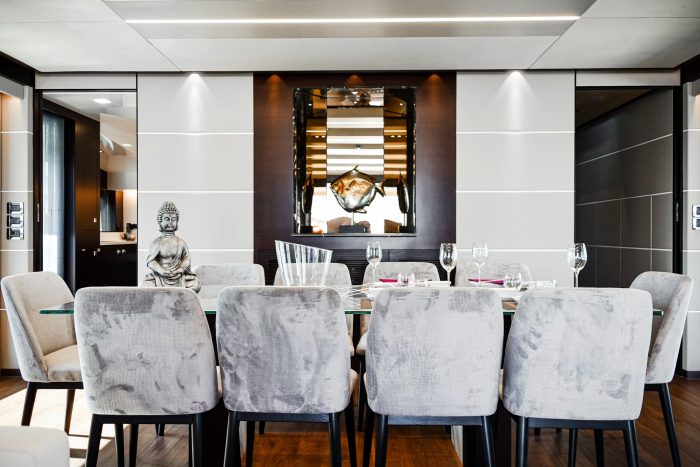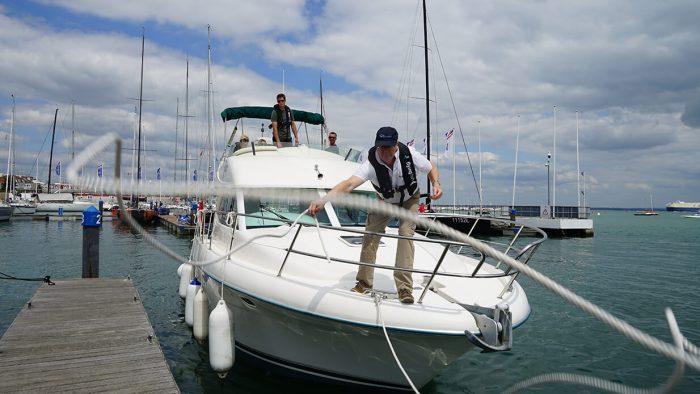If you’re considering a career in the Superyacht industry, one of the first questions you’ll encounter is whether to work on a private or charter yacht.
While both offer incredible opportunities to travel the world and earn excellent money, the experience working on them can be quite different. Whilst you can’t be picky when looking for your first job, having an understanding of Private and Charter yachts will help prepare you for life on board.
Understanding the types of yachts
Before diving into the differences, it’s important to understand that there are actually three distinct setups in the Superyacht world, not just two.
Charter Yachts are usually owned by companies and operated purely as commercial businesses. These yachts are rented out to guests for luxury holidays or corporate trips, similar to an exclusive floating hotel. Think of the setup you see on reality TV shows like Below Deck. However, pure charter yachts are actually rarer than many people think.
Private Charter Yachts represent a hybrid model that’s extremely common in the industry. These are owned by individuals who use the yacht for personal trips but also charter it out when they’re not onboard. This arrangement helps owners offset the enormous running costs of a Superyacht. For crew, this means your experience varies depending on whether you’re looking after the owner and their family or paying charter guests.
True Private Yachts are owned and used exclusively by the owner, their family and invited friends. Every trip brings different guests, but they’re all non-paying personal contacts of the owner. Crew on these yachts often develop long-term relationships with the owner’s social circle and enjoy more predictable routines.
For newcomers to the industry, it’s crucial to understand that you can’t afford to be too selective about yacht type when starting out. The most important factors are ensuring the yacht is safe, professionally run, and offers good training opportunities.

The day-to-day reality
From a practical standpoint, your actual job duties remain largely the same whether you’re working on a private or charter yacht. You’ll still be cleaning, providing service, doing laundry, standing watches, and maintaining the vessel to the highest standards. The real difference lies in the rhythm and pressure of your working environment.
On a private yacht, you have the luxury of developing routines and getting to know your guests’ preferences intimately. You learn that the owner takes coffee at 7:30 AM sharp, prefers their cabin cleaned while they’re at breakfast, and always wants the tender ready by 2 PM for afternoon excursions. This predictability allows you to plan your day and anticipate needs before they’re expressed.
Charter yachts present a completely different challenge. Every week or two brings an entirely new group of guests with different cultures, dietary requirements, and expectations. One week you might be serving a family with young children who want casual beach picnics, while the next brings corporate executives expecting formal dining and business facilities. You’re constantly adapting and learning on the fly, which keeps you sharp but can be mentally exhausting.
The pressure on charter yachts is generally higher because guests are paying premium rates for their experience. A week’s charter on a 42-meter yacht can cost upwards of €196,000 in high season, so guests naturally have elevated expectations. This means larger charter yachts often carry more crew than private yachts of similar size to ensure impeccable service levels.
The financial picture
Base salaries are typically the same whether you work on private or charter yachts, but the earning potential can differ dramatically through tips and bonuses.
Charter yachts offer the opportunity for substantial tips that can multiply your annual income. The industry standard is around 10% of the charter fee, divided equally among all crew members. Using our earlier example of a €196,000 weekly charter, that’s approximately €19,600 in tips shared among eight crew members, resulting in about €2,450 per person for one week’s work. During a busy charter season with multiple bookings, crew can realistically earn three to four times their base salary through tips alone.
Private yachts operate on a different tipping culture altogether. While tips aren’t standard practice, owners often show appreciation through generous gifts such as designer handbags, jewellery, watches, or cash bonuses, particularly around holidays or after exceptional service. However, these gifts aren’t guaranteed and depend entirely on the owner’s generosity and satisfaction with your work.
The trade-off for higher earning potential on charter yachts is the intense workload and constant pressure. Many crew find the money attractive but struggle with the relentless pace and frequent guest turnover, leading to higher burnout rates in the charter sector.
Workload
The difference in workload between private and charter yachts often surprises newcomers to the industry.
Charter yachts can be relentlessly demanding during charter season. You might work back-to-back charters for five to six weeks without a single day off, with each new group requiring you to learn their preferences and routines immediately. The turnover between guests is particularly intense, as you’ll often have just a few hours to completely reset the yacht, restock supplies, and prepare for the next arrival.
Private yachts present more variable workloads depending on the owner’s lifestyle. If the owner only uses their yacht for a few weeks each year, the rest of your time can feel more like a standard job focused on maintenance and preparation. However, don’t assume private yachts are automatically easier. Owners who are very active or use their yacht for racing can actually create more demanding schedules than charter operations.
Regardless of yacht type, expect long hours when guests are onboard. Sixteen to eighteen-hour days are common, with crew working in shifts to ensure 24/7 service availability.
Crew dynamics and career development
The different operational styles of private and charter yachts create distinct crew cultures and career progression opportunities.
Private yacht crews tend to have greater stability and longevity. The consistent routine and familiar faces create a family-style working environment where crew often stay for multiple seasons or even years. This stability allows you to develop deeper professional relationships and truly master your role, as you’re not constantly adapting to new situations.
Charter yacht crews experience higher turnover due to the intense pressure and burnout rates. The atmosphere tends to be more money-focused, with crew often viewing their time aboard as a way to maximize earnings before moving on. While this creates less stability, it also exposes you to a wider variety of experiences and challenges that can accelerate your professional development.
Both environments offer valuable learning opportunities, but in different ways. Charter experience teaches you to think quickly, adapt to diverse situations, and maintain exceptionally high standards under pressure. Private yacht experience allows you to develop deeper expertise, build lasting professional relationships, and understand the nuances of exceptional personal service.
Destinations and travel opportunities
Where you’ll travel depends largely on the type of yacht you choose.
Charter yachts typically stick to proven hotspots where guests expect to find established infrastructure and attractions. Monaco, St. Tropez, Ibiza, and the Caribbean “milk run” feature heavily in charter itineraries because these destinations offer the restaurants, nightlife, and activities that paying guests demand.
Private yacht itineraries can be far more adventurous and unpredictable. Owners might decide to explore remote islands, visit unusual destinations, or embark on expedition-style cruising that charter guests wouldn’t typically choose. This can lead to incredible experiences in places you’d never otherwise visit, though it might also mean longer periods away from major ports and social scenes.
Your options
As someone new to the superyacht industry, your primary focus should be finding a well-run, safe yacht that offers good training and professional development opportunities. While the private versus charter decision is important, it shouldn’t be your only consideration.
Look for yachts with good reputations, professional management, and crew who seem happy and well-treated. Ask about training opportunities, advancement prospects, and the yacht’s operational schedule. A well-run private yacht will serve you better than a poorly managed charter operation, and vice versa.
Remember that your first position is about learning the industry and developing your skills. Many successful crew members have worked on both private and charter yachts throughout their careers, gaining different experiences that make them more versatile and valuable.
Getting started
If you’re ready to begin your superyacht career, proper training is essential regardless of which type of yacht appeals to you. Both private and charter yachts require crew with STCW Basic Safety Training certification, and additional qualifications will make you more attractive to potential employers.
The superyacht industry offers incredible opportunities for travel, career advancement, and financial rewards. Whether you choose private or charter yachts for your first role, you’ll be embarking on a unique career that combines professional service with maritime adventure.
Ready to start your superyacht career? Contact us to learn about our comprehensive training courses that will prepare you for success on any type of yacht.





